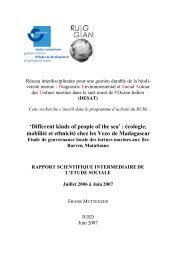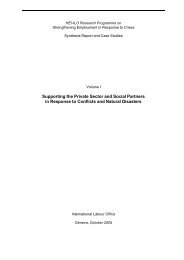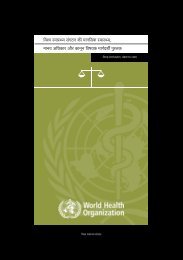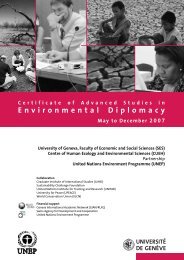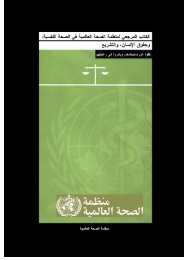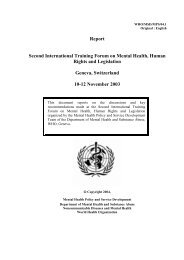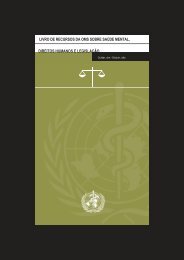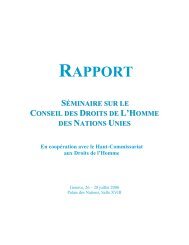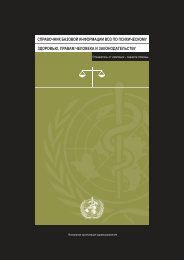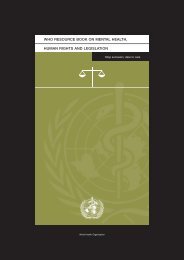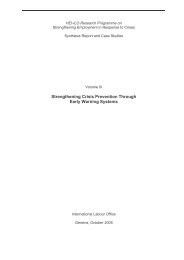Les liaisons fructueuses - RUIG-GIAN
Les liaisons fructueuses - RUIG-GIAN
Les liaisons fructueuses - RUIG-GIAN
Create successful ePaper yourself
Turn your PDF publications into a flip-book with our unique Google optimized e-Paper software.
II – <strong>Les</strong> origines du <strong>RUIG</strong> : un projet politique et universitaire<br />
pact of the United Nations’ action. Indeed, policies<br />
must be underpinned by comprehensive and<br />
cutting-edge research. Through a wide network of<br />
research institutes, policy planning units and similar<br />
bodies, the United Nations itself generates a<br />
large volume of high-quality analysis and research<br />
related to the challenges before the Organisation.<br />
It also works closely with independent researchers<br />
and experts in a wide range of areas, which enables<br />
it to draw on and be informed by the latest<br />
thinking and research results. Important efforts<br />
such as the report “In Larger Freedom : Towards<br />
Development, Security and Human Rights for<br />
All”, which provided the foundation for Member<br />
States’ negotiations prior to the 2005 World<br />
Summit, have thus incorporated and built on<br />
analysis and recommendations put forward by internationally<br />
renowned scholars.<br />
Within this context, the United Nations Office at<br />
Geneva (UNOG) has strived over the last decade<br />
to draw on the expertise of governments, civil society,<br />
including non-governmental organisations,<br />
regional and other inter-governmental organisations,<br />
as well as research and academic communities.<br />
As part of these partnership-building efforts,<br />
the Office has endeavoured, in particular, to act<br />
as an interface between the world of research and<br />
policy entities within the United Nations system.<br />
Through collaborative initiatives that promote<br />
regular interaction between policymakers and<br />
researchers and expand networks, UNOG seeks<br />
to stimulate and strengthen inclusive, forwardlooking<br />
discussions that cut across thematic and<br />
institutional boundaries. These include joint<br />
seminars and other events, which allow for open<br />
exchanges of experiences and views between policymakers<br />
and external experts, with a focus on<br />
lessons learned and formulation of proposals for<br />
application in the work of the United Nations.<br />
The establishment of <strong>GIAN</strong> offered a particularly<br />
welcome opportunity for UNOG to go one<br />
step further and deepen its engagement with<br />
academic and research institutions in Geneva.<br />
The city, and Switzerland as a whole, is home to<br />
a wide range of research and academic institutions<br />
with particular analytical expertise in areas<br />
of relevance to the work of the United Nations.<br />
While the term “International Geneva” refers to<br />
the large presence of international organisations<br />
and their staff in Geneva, “Intellectual Geneva”<br />
captures the academic and research capabilities<br />
in Geneva. <strong>GIAN</strong> is an example of what can be<br />
achieved when these two communities engage<br />
and collaborate in support of common goals.<br />
Over the years, <strong>GIAN</strong> has promoted resultsoriented<br />
and practical research to be applied in<br />
the work of international relations professionals.<br />
The five priority themes on which <strong>GIAN</strong><br />
selected to focus its activities from the very<br />
start, namely sustainable development, social<br />
equity, globalisation and international commerce,<br />
intercultural relations and dialogue and<br />
humanitarian law and human rights, have since<br />
acquired increasing relevance for the United Nations.<br />
As an observer member on the Board of<br />
<strong>GIAN</strong>, UNOG was therefore fully engaged in<br />
this unique effort to provide a dynamic platform<br />
for linking research and policy and foster collaboration<br />
between academic institutions and<br />
international organisations – both governmental<br />
and non-governmental – in the service of peace,<br />
justice and development.<br />
The diversity of the projects that it has supported<br />
is not only testimony to the multitude of<br />
entities that compose international Geneva but<br />
also to the breadth of issues which the mandate<br />
and objectives of the United Nations encompass.<br />
Perhaps more importantly, <strong>GIAN</strong> has once<br />
again demonstrated the importance of engaging<br />
all stakeholders to find common solutions to<br />
our shared threats and challenges. UNOG very<br />
much hopes that this spirit and the experience<br />
gained in many years of collaboration within a<br />
strong community of knowledge will infuse the<br />
new Swiss Network for International Studies in<br />
Geneva, which is to succeed <strong>GIAN</strong>.<br />
28



